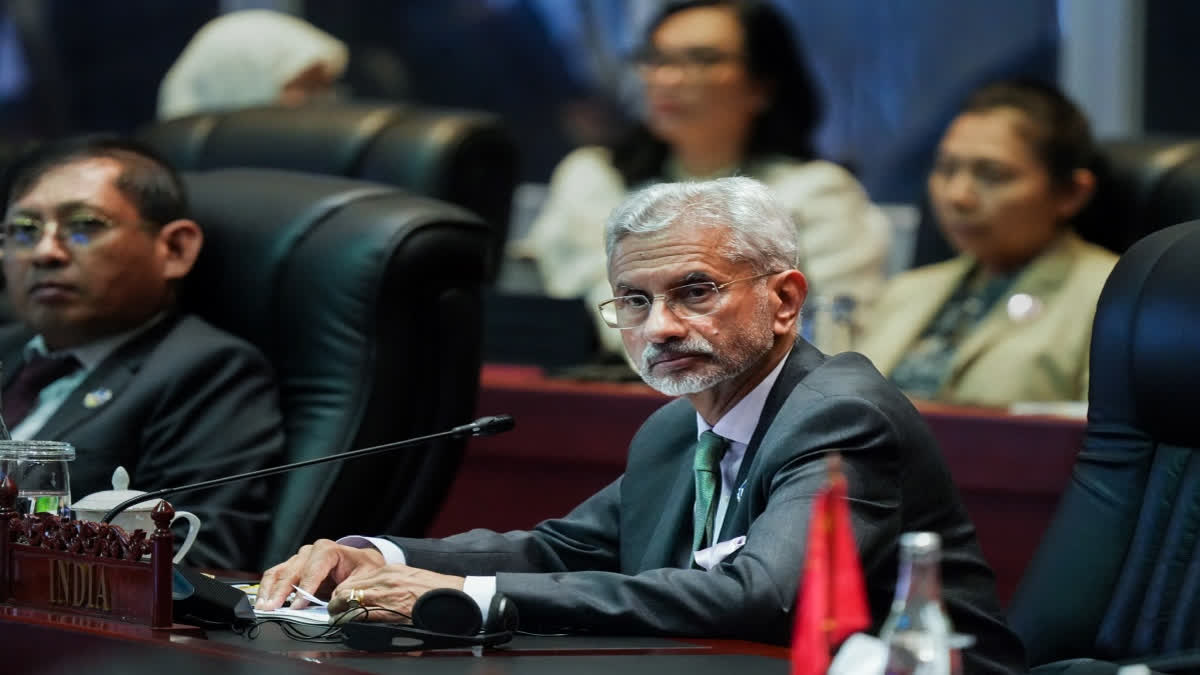New Delhi: External Affairs Minister S Jaishankar’s three-day visit to the Maldives starting on Friday is being viewed as signs of a thaw in the relations between India and the Indian Ocean archipelago nation after New Delhi-Male ties went downhill following the election of Mohamed Muizzu, who had carried out an anti-India campaign, as President.
According to a statement issued by the Maldives Foreign Ministry, Jaishankar will hold official talks with his Maldivian counterpart Moosa Zameer to review the existing bilateral cooperation, following which both Ministers will inaugurate the completed projects under the High Impact Community Development Projects (HICDPs) and Line of Credit facility of EXIM Bank of India and witness the exchange of memorandums of understanding (MoUs) on areas for capacity building, commerce and trade.
"Maldives is India's key maritime neighbour and an important partner in India's Neighbourhood First Policy and our Vision 'SAGAR' i.e. Security and Growth for All in the Region," a statement issued by the External Affairs Ministry here late on Thursday evening reads. "The visit is aimed at strengthening the close partnership between the two countries and to explore avenues to enhance the bilateral relationship further."
This is the first time that Jaishankar will be visiting the Maldives after assuming office as External Affairs Minister in June this year. This comes after Muizzu visited New Delhi to attend the swearing-in ceremony of Prime Minister Narendra Modi in June this year for the latter's third term in office. Ahead of this, Moosa visited India in May this year during the course of which he stated that there was a misunderstanding between the two countries "and we have passed that stage now". The Maldives is also running a tourism roadshow in India to attract Indians with that country's Tourism Minister Ibrahim Faisal taking a proactive role in this.
However, according to Anand Kumar, Associate Fellow at the Manohar Parrikar Institute of Defence Studies and Analyses and author of the book Multi-party Democracy in the Maldives and the Emerging Security Environment in the Indian Ocean Region, the Maldives’ reach-out will be judged by India on the basis of what that country does on issues of strategic concern for New Delhi.
Ties between India and the Maldives had gone south since Muizzu became President. Muizzu had won last year’s presidential election on a pronounced anti-India plank. He ran an 'India Out' campaign in which he called for the withdrawal of some Indian military personnel present in his country. These personnel, numbering less than 100, were primarily involved in humanitarian assistance and disaster relief work in the Indian Ocean archipelago nation. However, after assuming office, Muizzu made a formal request to India to withdraw these personnel. These personnel have now been replaced by civilians from India.
In December last year, the Maldives decided not to renew a hydrography agreement with India citing national security concerns and the safeguarding of sensitive information. The hydrographic survey agreement was signed on June 8, 2019, during Modi’s visit to the Maldives. Under the agreement, India was allowed to conduct a comprehensive study of the island nation's territorial waters, which includes reefs, lagoons, coastlines, ocean currents and tide levels.
And then again, in January this year, the Maldives decided to allow a Chinese vessel to enter its territorial waters ostensibly to do research work. This decision came despite pressure from the Indian government and concerns raised by various quarters about the vessel being a "spy vessel". India has strongly been protesting the repeated visits by Chinese vessels to the waters of the south Indian Ocean, a region New Delhi considers to be under its sphere of influence.
Also, in early January this year, a political row broke out between India and the Maldives after Prime Minister Modi visited the union territory of Lakshadweep in the Arabian Sea and promoted it on social media as an exciting tourism destination. Though Modi did not mention any other country in his comments, some Maldivian politicians took it as the Lakshadweep islands being showcased as a rival to the tourism industry in the Indian Ocean archipelago nation. They made disparaging remarks against the Prime Minister and racist comments against Indians in general.
This sparked a social media backlash from Indians, including entertainment world celebrities and sports stars. Many opposition leaders and tourism industry bodies in the Maldives also criticised the Muizzu government for this. Following this, three junior ministers in the Maldives government were suspended.
Soon after the row, Muizzu went on a nearly week-long visit to China. This was a break from the practice followed by his three immediate democratically elected predecessors - Ibrahim Solih, Abdulla Yameen and Mohamed Nasheed - who had made India the destination of their first state visit after assuming office. In fact, after assuming office in November last year, Muizzu made Turkey the destination of his first state visit.
